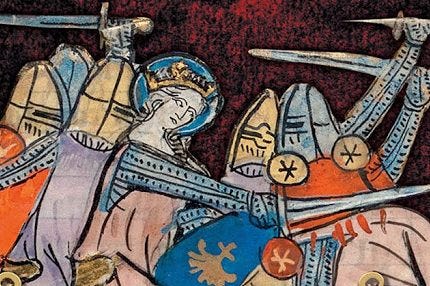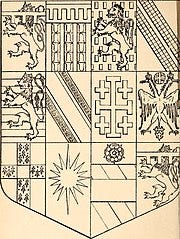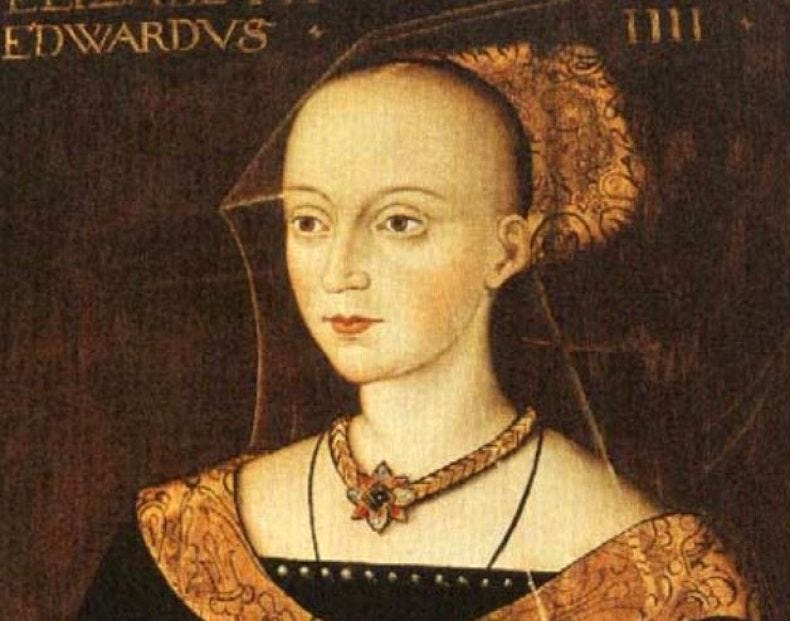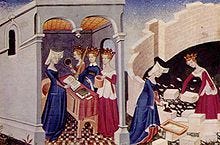Finding Lost Voices: A Conversation with 15th Century Feminist and her biographical subject, Jacquetta of Luxembourg (1415 or 1416 – 1472)
A weekly email that brings back the voices of those who have been forgotten or maligned
This week, I got to sit down with Kate Wagner, the author of the amazing Substack 15th Century Feminist. Kate's goal is to “disrupt the patriarchal single story, which both upholds and encourages the false belief of (white) male supremacy while providing resources for further (self) discovery.” We talked over Zoom about the work she does on her monthly blog and the biography she has in progress about Jacquetta of Luxembourg (1415 or 16 - 1472).
Iris: Hi Kate, can you tell me about the origin story of your Substack?
Kate: I love that question. Thank you for asking it. I’ve been writing a biography about a 15th-century woman named Jacquetta of Luxembourg. She was the mother of a queen, yet she remains almost entirely undocumented, and when she does appear in historical records, she’s often maligned. Accusations of witchcraft and sorcery have shaped her image, and when she is mentioned, it’s usually in the context of extreme greed. In fact, the word avarice is almost always linked to her whenever someone writes about her. Many descriptions focus on her "cold, hard eyes," yet there are no physical descriptions of her, and no imagery of her exists. It's as though biographers have constructed this persona of a greedy woman that may not have been true. Much in her life suggests she wasn’t greedy, and her story is far more complex than that. I began searching for stories because I couldn't find her. I wanted to learn who knew her or who might have impacted her life. Along the way, I discovered all these other women, each of whom was profound, powerful, and instrumental in shaping not only the culture but also the national identity of England during the 14th and 15th centuries. I needed a place to write about these women, and I envisioned creating quick, offshoot pieces to share their stories with the world. But I didn’t have that platform. So, I began documenting their journeys in a Word document. Then, I realized I was receiving a newsletter from one of my favorite feminist authors, Liz Plank. I thought, 'Wait, what platform does she use for this?' I opened the newsletter and saw it was on Substack. That’s when it hit me—maybe I could share these women's stories there. Perhaps someone would want to read about them. And, to my surprise, people did.
Iris: What a fantastic origin story! Tell us more about how your monthly posts work. How do you come up with ideas?
Kate: What happens is I’m researching Jaquetta, and then I come across a name, a story, and suddenly, it’s a side quest. Now, I feel like I have to write about her. Three books later, I’m deep into learning everything about this woman, and I want to share her story with everyone. And that’s why the book takes so long to write!
Iris: A side quest! I love it! And I can completely understand! I too, find myself falling down the rabbit hole of research. Could you tell us more about the woman you are writing a biography about? Where did she live?
Kate: Sure! Jacquetta of Luxembourg was born in the Duchy of Luxembourg, part of France at the time. Her family hailed from Italian and French nobility, with a long and prestigious lineage that traces back to Greek mythology—truly ancient noble blood.
Although she wasn’t the daughter of kings or queens, she was still considered a lesser noble due to her rank. However, her bloodline was far from inferior. She lived in France until age 17 when she married John, Duke of Bedford, the brother of Henry V. But tragically, he died just two years into their marriage. What’s particularly interesting—and unusual given England's laws—is that he left everything to her: his properties, his homes, his money—everything. However, England refused to honor his will and took most of it from her. It’s fascinating, though, that in such a short time—just two years of marriage—he amended his will to leave everything to her. At that time, England was deeply fractured and on the brink of the War of the Roses, embroiled in civil war. So, England could not afford to let her inherit what he had intended to give her. They seized all of her assets, but she was relentless. What sets her apart is her books. We have records of what she owned, including the library she inherited. She was also incredibly litigious—she fought for what was rightfully hers. When England took her property, she didn't back down. She went after every single one of them, and she continued her fight until her death at 52.
Iris: Do we know how she died?
Kate: They believe she died from heart failure, though we don't know for sure. We also don’t know where she was laid to rest. There's very little information about the end of her life. She was the mother of a queen, yet she literally just dies and disappears. It’s all so mysterious.
Iris: What about her children? How many did she have?
Kate: She had fourteen children, and her eldest daughter went on to become the Queen of England. Known as the 'Commoner Queen,' her daughter’s life was filled with challenges, including being tried for witchcraft. Of course, there were a whole series of controversies surrounding her.
Iris: Jacquetta of Luxembourg must have been a strong woman!
Kate: Oh my goodness, truly! One of my favorite stories about her—though it's well-known—is that after she was accused of witchcraft, she goes to the Mayor of London and says, 'Wait a second, I’ve done too much for this city for you to be blaming me for witchcraft. You need to go to court and clear my name.'
The mayor then gathers a group of men and goes to court in her defense, resulting in the charges being dropped. But that wasn’t enough for Jaquetta. Knowing the history of how women were treated in England, she went to Parliament and demanded that it be officially recorded that she was not a witch.
Iris: Oh my god, I love her!
Kate: Right. She's a queen, or she wasn't a queen. She's a mother queen, but she's a queen. She was fully aware of how women were treated and how they were talked about. Jaquetta did everything in her power to fight against it. Additionally, she owned one of the earliest copies of Christine de Pizan's The Book of the City of Ladies.
Iris: That is one of my favorite books!
Kate: Her signature and motto, which essentially means 'above all others,' reflecting her belief in placing herself above the rest, is written in Christine de Pizan's book. When I saw her name there, I just sobbed. I imagined her holding that book—the same text we've read, this early feminist literature. It’s incredible that these women existed long before these words were written or recognized in academia. They were there, shaping history, long before we gave them credit.
Iris: Yes, it turns out these strong women have been around the whole time even though we were never taught about them!
Kate: The only reason we don’t know about these women is because their stories challenge patriarchy. We’re not supposed to know about them because it disrupts the idea that men are the natural leaders. These women’s existence doesn’t fit that narrative.
Iris: There is so much work to be done!
Kate: There’s still so much work to be done. Exactly. I’ve found my little niche in the 15th century, and I’m digging in.
Iris: Thank you so much Kate for taking the time to meet with me today! Readers, I highly recommend reading Kate’s Substack: 15th Century Feminist!
Upcoming Events
December
December 11, 7:00 PM - Iris Jamahl Dunkle in Conversation with Lisa Moore, Book Woman, Austin, TX
January 2025
January 11 - Daughters of the Revolution
January 12 3:30 PM - 5:00 PM - California Writers' Club Marin chapter talk on "Building a Readership with Biographer and Poet Iris Jamahl Dunkle" at Dominican University
January 15, 10:30 AM Century Club Reading, SF, CA
January 24 - Case Western Reserve University, Cleveland, OH
January 25 - Reading with Jan Beatty at White Whale Books in Pittsburgh, PA
January 27, 6:30 PM - Iris Jamahl Dunkle in Conversation with Donovan Hohn at Literati in Ann Arbor, MI
January 28 - 6:00 PM Iris Jamahl Dunkle at Morgenstern Books, Bloomington, Indiana
January 30, 6:00 PM - Riding Like the Wind: The Life of Sanora Babb with Iris Jamahl Dunkle, The Mechanics Institute, SF, 57 Post Street San Francisco, CA 94104
February
February 21, Iris Jamahl Dunkle’s talk at New York University, New York, NY
February 26, 6:00 PM Iris Jamahl Dunkle reads at King's English, Salt Lake City, UT
February 27 - Iris Jamahl Dunkle reads at American West Center, Salt Lake City, UT
March
March 5 - The Bill Lane Center for the American West: Stanford, CA
March 6 - UC Boulder/Center for the West, online lecture.
March 13- 5:00 PM Garden City Community College, Kansas
March 14 - Books and Books in Key West, FL
March 21 - 2:00 PM New York Public Library, New York City
March 30, 4:00-5:30 PM, Occidental Center for the Arts, Occidental, CA
May
May 17 - 5:30 - 7:30 PM - National Steinbeck Center, Salinas, CA











I love this interview! Wonderful true story now NOT lost to history.
It was so great chatting! What a dream to sit and gush of Jacquetta — I’m grateful for the space made!! 💜💜💜